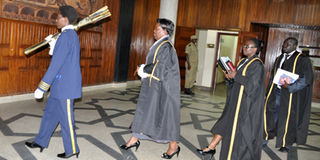Spineless legislature a recipe for disaster

Speaker Kadaga (2nd L leaves Parliament after a heated debate on Thursday). PHOTO BY GEOFFREY SSERUYANGE
The Legislature, Executive and Judiciary are the three basic organs of the state. In our African mentality, we may refer to them as the three cooking stones which make every meal possible. Once they are well organised to function in the interest of the people as a whole, the common good of the nation is served and the country develops in stability and joy.
Often, we judge ourselves by what we feel capable of doing, while others judge us by what we have already done. Equally, the institution of Parliament is judged on its relevance to the people and how persistent members are. But the fecklessness in Parliament over the oil debate has offended some sections of the public.
Forget the bipartisan display of nationalism and willingness to deal with corruption in the oil sector; when debate returned on Tuesday, the ruling party members even those who had signed the landmark oil petition ate their words. It was a lugubrious show that left many Ugandans disappointed. They deceived us. Indeed, they took us for a ride. It appears they were not serious after all. The oil debate was a mockery. We were wrong about them, they are all the same. They are all self-seekers— the omen of deception, just like their friends in the crooked Seventh Parliament and the faint-hearted Eighth Parliament.
The monkey business of NRM MPs whose statistical strength in the House should have been an asset in our amorphous war against corruption instead confused many Ugandans of good will and left others wondering whether Parliament really deserves to be called the “August House”. The reference to the Ugandan Parliament as the August House is rather satirical; the word august refers to something ‘dignified’.
Unfortunately, with exception of the Sixth Parliament, under the guidance of the late, James Francis Wambogo Wapakhabulo, Ugandans nowadays consider the institution of Parliament an icon of disgrace. Why? The answer is marked; on several occasions they have decided to affront the people.
Parliament is not all about filling seats during debates, boo others without serious justification and then excitedly trooping to the lounge and Parliament canteen to while away time in endless tittle-tattle. Let’s remind ourselves of the significance and real meaning of the institution of Parliament. In ancient Greece, men anointed by society as wise met regularly under trees to decide on the affairs of society on behalf of the people.
Indeed, the Greeks of yore believed that individual human beings agreed to cede a good constituency of their private rights to get protection, stability and provisions of an effective social organisation or government. Parliament, as we know it today, acquired its meaning as it came to be used for the body of people (in an institutional sense) who would meet to discuss matters of state and not matters of political parties competing for political prowess.
The role and functions of Parliament assume great significance in view of the basic principles and assumptions associated with parliamentary democracy. A parliamentary form of government acknowledges the fact that in this system, Parliament derives its power directly from the consent of the people expressed through periodic elections and that it exists to implement the will of the people.
I have been telling colleagues that Uganda’s Parliament is such a strange institution, “where termites have the ability to eat iron bars and eagles can fly away with cement”. Of course, not a soul believed me, until Tuesday this week— the day some NRM MPs made a U-turn on Parliament resolutions. They managed to arm-twist Speaker Rebecca Kadaga who should have called the mob to order. As the outspoken Lwemiyaga MP Theodore Ssekikubo put it last week; the NRM MPs behaved like a “hired mob” yet an exasperated reader called them “wolves masquerading in sheep’s clothing”.
The comedy last week started in Kyankwazi, where the President cajoled MPs to overturn their resolutions. At the end of a follow-up State House meeting on Monday, it was already a done deal— Prime Minister Amama Mbabazi and Internal Affairs Minister Hilary Onek who have been accused of taking bribes will not step aside and the $2.9 billion Total-CNOOC farm-out deal with Tullow Oil must proceed even after the House put a moratorium on execution of oil contracts until oil laws are in place. As such, they came to Parliament and began shouting and heckling whoever tried to remind Speaker Rebecca Kadaga the need to implement of resolutions they had passed earlier.
For many, including myself, the oil debate in the Ninth Parliament had won countless accolades. The congratulatory messages to Ms Kadaga were a symbolism of trust and readiness to cultivate a new path. As for Speaker Kadaga, until now, I am wondering what exactly went wrong that day. I know the fact that she met a group of ministers that day, but I don’t want to believe that she was arm-twisted in any way.
That said, I am finding it hard to see how the NRM MPs will be able to reverse the damage they inflicted on the integrity of the House. If Parliament is going to pass resolutions and reverse them the following day, then Ugandans need to worry.
In fact, if the treachery continues, then, an impending Constitution Amendment seeking to scrap bail right for some offenders (rioters, economic saboteurs and rapists) with a ludicrous proposal to give away part of Mabira forest on the cards, the writings are already on the wall. If the status quo remains, even the findings of an Ad hoc Committee which is going to investigate ministers who have been accused of pocking bribes will not yield much, just like the Temangalo and Chogm reports.




